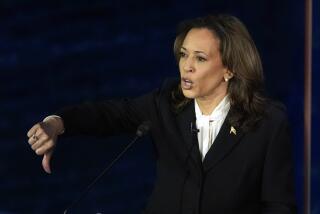Don’t Try to Shift Postwar Polish Boundaries, Solidarity Warns Bonn
- Share via
BONN — A senior member of Poland’s Solidarity trade union warned West Germany here Friday that the Federal Republic should not try to tamper with Poland’s postwar boundaries.
The warning came during a visit of Solidarity members to Bonn, and at what has been called a low-point in relations between Poland and West Germany.
The Solidarity official, Bronislaw Geremek, declared after meeting Chancellor Helmut Kohl and Foreign Minister Hans-Dietrich Genscher that any changes in the Oder-Neisse Line would “do harm to German-Polish relations and also to stability in Europe.”
The Oder-Neisse Line, named after two rivers, established the new border between East Germany and Poland after World War II, including on the Polish side territory that was totally German before the conflict began. Some of Poland’s largest cities, such as Wroclaw and Szczecin, and its biggest industrial region in southeastern Silesia, stand on what was German territory before the 1945 defeat of the Nazis.
Recent statements by some West German officials, including Finance Minister Theo Waigel, a conservative Christian Socialist from Bavaria, have suggested that the Oder-Neisse Line might not be a permanent border.
Waigel, whose party is allied with the governing Christian Democrats, is leading their joint effort to regain ultra-conservative members who have been voting for the far-right Republican Party.
In an effort to play to that vote he said earlier this week that “eastern German territories” are still “part of the German question.” He said his party would never allow the demand for reunification of the two Germanys to be stricken from the West German constitution.
Such remarks hit a raw nerve in Poland.
On Thursday, Poland’s Communist Party newspaper sharply attacked West Germany and demanded that Bonn abandon all claims to what is now Polish territory.
The newspaper Trybuna Ludu declared that the “only possible and existing basis for the full normalization of relations between Poland and West Germany is the treaty of Dec. 7, 1970.”
This is the Warsaw Treaty, in which West Germany recognized the postwar boundaries of Poland, and, in effect, renounced any claim to its prewar lands east of the Oder-Neisse Line.
Bonn Regime Criticized
The Communist paper also criticized the Bonn government for delaying Chancellor Helmut Kohl’s planned visit to Warsaw this month. Kohl said that he was delaying his visit to Poland because of the unsettled nature of the government there--a new president has yet to be elected--and because details of a financial support package for Warsaw had not been agreed on.
But critics have suggested that, in playing to conservative German voters, Kohl did not want to make a visit to Poland now because such a visit would involve declarations of support for the Polish government and its reforms and some expression of apology for World War II.
The scheduled visit would have, in protocol terms, allowed West German President Richard von Weizsaecker to attend ceremonies in Poland on Sept. 1 marking the 50th anniversary of the German invasion which began the war.
For its part, West Germany has had complaints about the treatment of the German minority in the former German territories. Yet, when members of that same minority are allowed to emigrate to West Germany, as they have been in increasing numbers in recent years, the competition they create for jobs and housing has caused some resentment.
There is anger, too, toward the flood of Polish emigrants or illegal workers who have taken advantage of liberalized passport laws to travel via East Germany to West Germany.
Even the thousands of Poles who drive into West Berlin every weekend to sell household goods and family heirlooms for precious hard currency have ruffled sensibilities because their unsightly sprawling flea market offends some West Berliners’ notions of order and dignity.
That weekly caravan is only one reflection of Poland’s crippled economy.
The Bonn government has agreed in principle to advance financial credits to Poland but wants the funds to be designated for specific projects, rather than a blank check for the Warsaw government.
This view was supported by Solidarity’s Geremek in his meeting Friday with West German leaders.
“Only a reforming and a reformed economy in Poland deserves support from outside,” the opposition movement’s parliamentary leader told a news conference here.
Large Foreign Debt
Poland has a $39-billion foreign debt, on which it pays only about half the annual interest.
Solidarity has proposed a $10-billion package of measures to salvage the Polish economy, including rescheduling of the debt and new credits from the International Monetary Fund and the World Bank.
Polish Foreign Ministry spokesman Stefan Staniszewski said Friday that the Communist Party leader, Gen. Wojciech Jaruzelski, has asked the West for a multibillion-dollar economic rescue package for Poland but totaling less than a $10-billion package suggested by Solidarity. But he said the proposals amounted to several billion dollars spread over a number of years.
Staniszewski said a letter from Jaruzelski was handed to French officials Thursday for consideration at a Paris summit of the seven main industrial nations next week.
Willing to Help
West Germany and other European countries, as well as the United States, have indicated a willingness to help Poland, but only if the Warsaw government comes up with tight budgetary proposals.
The question of major loans to Poland is expected to be raised with President Bush during his visit to Poland beginning Sunday, as well as at the industrialized nations summit.
More to Read
Sign up for Essential California
The most important California stories and recommendations in your inbox every morning.
You may occasionally receive promotional content from the Los Angeles Times.













